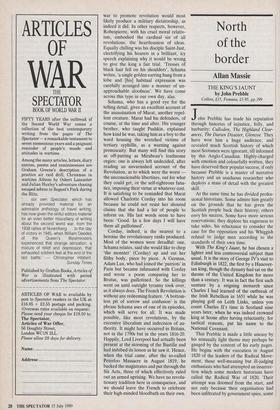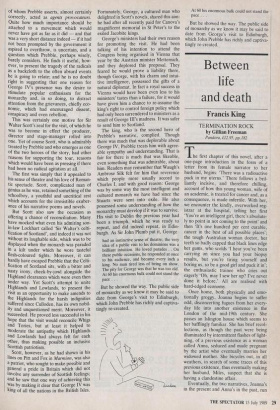North of the border
Allan Massie
THE KING'S JAUNT by John Prebble
Collins, f15, Fontana, f3.95, pp.399
John Prebble has made his reputation through histories of injustice, folly, and barbarity: Culloden, The Highland Clear- ances, The Darien Disaster, Glencoe. They have won him a huge audience, and revealed much Scottish history of which most Scotsmen were ignorant, till informed by this Anglo-Canadian. Highly-charged with emotion and colourfully written, they have deserved their popular success, if only because Prebble is a master of narrative history and an assiduous researcher who deploys a mass of detail with the greatest skill.
At the same time he has divided profes- sional historians. Some admire him greatly on the grounds that he has given the Scottish people back their history; others envy his success. Some have more serious reservations; they deplore his eagerness to take sides, his reluctance to consider the case for the opposition and his Whiggish refusal to judge men according to the standards of their own time.
With The King's Jaunt, he has chosen a lighter and less controversial subject than usual. It is the story of George N's visit to Edinburgh in 1822, the first by a Hanover- ian king, though the dynasty had sat on the throne of the United Kingdom for more than a century. It was in fact the first such venture by a reigning monarch since Charles I had learned of the outbreak of the Irish Rebellion in 1651 while he was playing golf on Leith Links, unless you count Charles II's time in Scotland nine years later, when he was indeed crowned king at Scone after having reluctantly, for tactical reasons, put his name to the National Covenant.
That Prebble is made a little uneasy by his unusually light theme may perhaps be gauged by the content of his early pages. He begins with the execution in August 1820 of the leaders of the Radical Move- ment, those well-meaning but ill-judging enthusiasts who had attempted an insurrec- tion which some modern historians have called the Radical War of 1820. Their attempt was doomed from the start, and not only because their organisation had been infiltrated by government spies, some of whom Prebble asserts, almost certainly correctly, acted as agents provocateurs. Quite how much importance should be attached to a movement which would never have got as far as it did — and that was a very short distance indeed — if it had not been prompted by the government it aspired to overthrow, is uncertain, and a question which Prebble, perhaps wisely, barely considers. He finds it useful, how- ever, to present the tragedy of the radicals as a backcloth to the often absurd events he is going to relate; and he is no doubt right in suggesting that one reason for George IV's presence was the desire to stimulate popular enthusiasm for the monarchy and, in so doing, to distract attention from the grievances, chiefly eco- nomic, which had encouraged dissent, conspiracy and even rebellion.
This was certainly one motive for Sir Walter Scott's zeal for the visit, of which he was to become in effect the producer, director and stage-manager rolled into one. Yet of course Scott, who is admirably treated by Prebble and who emerges as one of the two heroes of the story, had other reasons for supporting the tour, reasons which would have been as pressing if there had been no radical agitation at all.
The first was simply that it appealed to his sense of theatre and his love of Roman- tic spectacle. Scott, complicated man of genius as he was, retained something of the schoolboy, a youthful and uncritical zest which accounts for the irresistible exuber- ance of his narrative poems and novels.
But Scott also saw the occasion as offering a chance of reconciliation. Many have mocked what even his admiring son- In-law Lockhart called 'Sir Walter's celti- fication of Scotland', and indeed it was not without its laughable side, which was to be displayed when the monarch was paraded In a kilt under which he wore tasteful flesh-coloured tights. Moreover, it can hardly have escaped Prebble that the Celti- fication of Scotland sits, with a bitter and nasty irony, cheek-by-jowl alongside the Highland clearances which were even then under way. Yet Scott's attempt to unite Highlands and Lowlands, to present the visit as an opportunity to make amends to the Highlands for the harsh indignities suffered since Culloden, has its own nobil- ity and unquestioned merit. Moreover, it succeeded. He proved less successful in his hope that the visit would reconcile Whigs and Tories, but at least it helped to moderate the antipathy which Highlands and Lowlands had always felt for each other, thus making possible an inclusive Scottish patriotism.
Scott, however, as he had shown in his lines on Pitt and Fox in Marmion, was also a patriot, who sought to make possible and general a pride in Britain which did not involve any surrender of Scottish feelings; and he saw that one way of achieving this was by making it clear that George IV was king of all the nations in the British Isles. Fortunately, George, a cultured man who delighted in Scott's novels, shared this aim: he had after all recently paid for Canova's magnificent memorial in St Peter's to the exiled Jacobite kings.
George's ministers had their own reason for promoting the visit. He had been talking of his intention to attend the Congress being organised in Vienna that year by the Austrian minister Metternich, and they deplored this proposal. They feared he would prove a liability there, though George, with his charm and intui- tive intelligence, possessed the gifts of a natural diplomat. In fact a royal success in Vienna would have been even less to his ministers' tastes than a failure, for it would have given him a chance to re-assume the king's right to control foreign policy which had only been surrendered to ministers as a result of George III's madness. It was safer to send him to Scotland.
The king, who is the second hero of Prebble's narrative, complied. Though there was much that was deplorable about George IV, Prebble treats him with agree- able sympathy and understanding. That is fair for there is much that was likeable, even something that was admirable, about him. Readers may remember that Waugh's Ambrose Silk felt for him that reverence which people more usually accord to Charles I, and with good reason: George was by some way the most intelligent and cultured monarch we have had since the Stuarts were sent into exile. He also possessed some understanding of how the monarchy must develop if it was to survive. His visit to Dublin the previous year had been a triumph, which he was ready to repeat, and did indeed repeat, in Edin- burgh. As Sir John Plumb put it, George
had an instinctive sense of theatre; the very idea of a public visit to his dominions was a brilliant intuition. He loved parades . . On these public occasions, he responded at once to his audience, and became every inch a king. No man tired less of being on show. The pity for George was that he was too old. At 60 his enormous bulk could not stand the pace . . .
But he showed the way. The public side of monarchy as we know it may be said to date from George's visit to Edinburgh, which John Prebble has richly and captiva- tingly re-created.
At 60 his enormous bulk could not stand the pace . . .
But he showed the way. The public side of monarchy as we know it may be said to date from George's visit to Edinburgh, which John Prebble has richly and captiva- tingly re-created..



















































 Previous page
Previous page